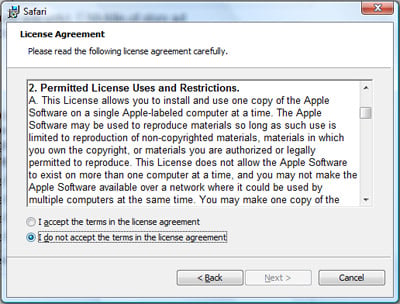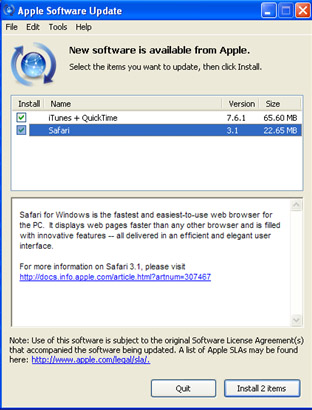This article is more than 1 year old
Apple forbids Windows users from installing Safari for Windows
First they mock web security. Then EULAs
After the following story was posted, Apple changed its license to allow Safari for Windows on Windows PCs. At least in part
In using Apple Software Update to slip his Safari browser onto millions of Windows PCs, Steve Jobs didn't just undermine "the security of the whole Web". He's made a mockery of end user licensing agreements.
As spotted by our Italian friends at setteB.IT, Apple's Safari license says that users are permitted to install the browser on no more than "a single Apple-labeled computer at a time." This means that if you install Safari for Windows on a Windows PC, you're violating the license.

Apple dabbles in paradox
Early last week, as Apple unveiled Safari version 3.1, it began offering the browser to Windows users via the Apple Software Update tool that accompanies iTunes and Quicktime. In other words, millions of people who don't use Safari have now been confronted with a pop-up window that lists the browser as an important software "update."
And this is an offer that many iTunes and Quicktime users are less than likely to refuse. When that pop-up window pops up, the go-ahead-and-install-Safari button is checked by default.

Apple forces Safari onto Windows
But you'll also notice that in pushing Safari onto Windows machines, Apple Software Update points out that Safari is subject to an Apple licensing agreement. "Use of this software is subject to the original Software License Agreement(s) that accompanied the software being updated," the "updater" says. And that licensing agreement forbids the use of Safari on Windows machines.
The agreement was last updated in January of this year, six months after Safari for Windows made its debut.
According to Jonathan Kramer, a tech-minded attorney with the Kramer Telecom Law Firm, you aren't in any legal danger if you install Safari for Windows on a Windows PC. Apple can't enforce a contract clause that doesn't make sense. "We call this an impossibility issue," Kramer told us. "You can't enforce a term that's impossible."
So this is merely a case of Apple making itself look silly. ®
